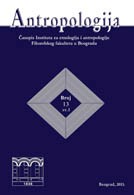THE RESTORATION OF PUBLIC CELEBRATIONS OF MUNICIPAL ‘SLAVAS’ AND RELIGIOUS FESTIVALS IN BELGRADE AS A SYMBOLIC DEMARCATION BETWEEN POLITICAL SYSTEMS
THE RESTORATION OF PUBLIC CELEBRATIONS OF MUNICIPAL ‘SLAVAS’ AND RELIGIOUS FESTIVALS IN BELGRADE AS A SYMBOLIC DEMARCATION BETWEEN POLITICAL SYSTEMS
Author(s): Danijel SinaniSubject(s): Customs / Folklore, Cultural Anthropology / Ethnology
Published by: Институт за етнологију и антропологију
Keywords: municipal slava; public celebration;religious holidays/festivals; political structures; tradition; reconstruction;
Summary/Abstract: This work analyzes the process of restoration of public celebrations of municipal ‘slavas’ (patron Saint’s day) and religious festivals, taking as an example the celebration of the Pentecost and the Epiphany in the municipality of Čukarica. The restoration of the public celebrations of religious holidays in local municipalities started after a series of political changes in local authorities at the end of the 20th century and has continued particularly after the ‘democratic’ changes in 2000. In most Belgrade municipalities, as well as in the Municipality of Čukarica on the day of the municipal ‘slava’ there is a procession and gathering around the sacred tree – ‘zapis’.3 Representatives of the Serbian Orthodox Church, members of the local government and citizens take part in the event. The celebration of the Epiphany also includes the traditional diving/swimming for the Cross of Honour. With this practice from the start, the new municipal government symbolically cut ties with the former regime which abolished or reduced to the minimum the ‘traditional’ religious practices. This sort of ‘return to the tradition’ aroused problems in the reconstruction and reinterpretation of the customary practices. Therefore in the first years of the celebrations, often appeared fabricated, even mutually conflicting elements. Together with considering the processes of creating tradition, this work pays special attention to the roles of the individuals in organizing and creating the "scenarios" for the celebrations as well as to the roles of political structures in the restoration of the public celebrations of religious festivals.
Journal: Antropologija
- Issue Year: 13/2013
- Issue No: 1
- Page Range: 23-37
- Page Count: 15
- Language: English

